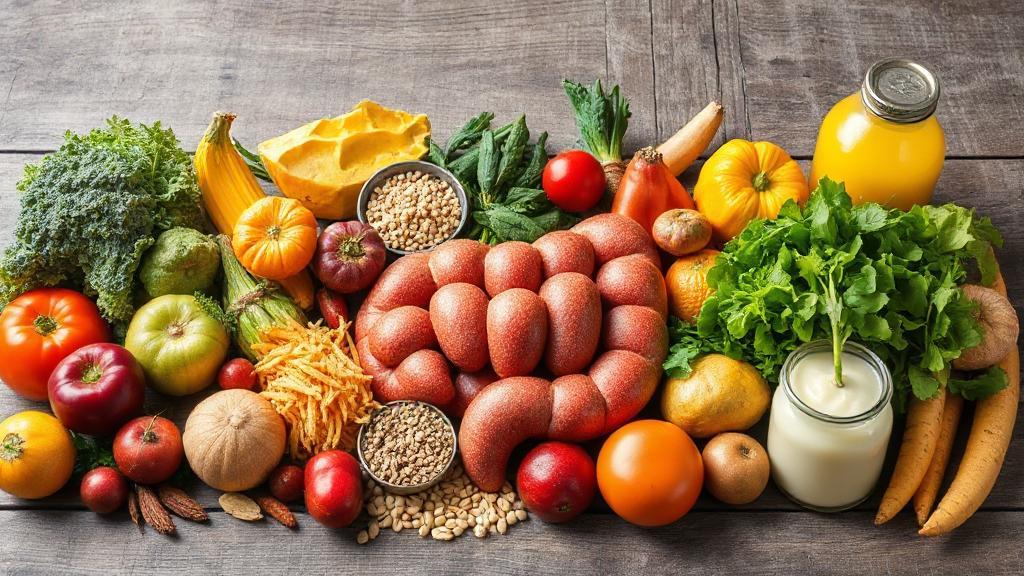Understanding Gut Health and the Microbiome
Your gut is home to trillions of microorganisms—bacteria, fungi, and other microbes—collectively known as the gut microbiome. This complex ecosystem is essential for digestion, immune function, nutrient absorption, and even mental health. When your gut is balanced and thriving, you’re more likely to experience better energy, mood, and resilience against illness. Conversely, an imbalanced microbiome (dysbiosis) can contribute to digestive issues, inflammation, autoimmune conditions, and mental health challenges.
To learn more about the role of probiotics in gut health, see Top probiotics for improving gut health.
Dietary Strategies for a Healthier Gut
1. Diversify Your Diet
A diverse diet supports a diverse microbiome, which is linked to better gut health. Different bacteria thrive on different nutrients, so variety is key.
- Eat a rainbow of fruits and vegetables: Each color provides unique phytonutrients and fibers.
- Try new whole grains: Quinoa, farro, barley, and brown rice offer different fibers and nutrients.
- Include legumes, nuts, and seeds: These are rich in both fiber and beneficial plant compounds.
For more on the benefits of plant-based eating, visit Top benefits of adopting a plant-based diet.
2. Increase Fiber Intake
Fiber is the primary fuel for beneficial gut bacteria. When fermented by these microbes, fiber produces short-chain fatty acids (SCFAs) that support gut lining health and reduce inflammation.
High-fiber foods include:
- Beans and lentils
- Berries
- Broccoli
- Oats
- Apples
For more tips, see Effective ways to improve digestion naturally.
3. Embrace Fermented Foods
Fermented foods are rich in probiotics—live beneficial bacteria that can enhance your gut microbiome.
Popular fermented foods:
- Yogurt with live cultures
- Kefir
- Sauerkraut
- Kimchi
- Miso
- Tempeh
- Kombucha
For more details on choosing the right probiotic foods and supplements, check out The best probiotics for women: Top strains and supplements for optimal health and The best probiotics for kids: What parents need to know.
4. Limit Processed Foods and Added Sugars
Highly processed foods and excess sugar can disrupt the balance of gut bacteria, promoting the growth of harmful species.
Strategies:
- Cook more meals at home.
- Read ingredient labels to avoid hidden sugars.
- Choose whole foods over packaged snacks.
Lifestyle Adjustments for Gut Wellness
1. Stay Hydrated
Water is essential for digestion and helps maintain the mucosal lining of the intestines. Proper hydration also supports the movement of food and waste through the gut.
Tip: Aim for at least 8 cups (about 2 liters) of water per day, adjusting for activity level and climate.
2. Manage Stress
The gut and brain are in constant communication via the gut-brain axis. Chronic stress can alter gut permeability, disrupt microbiome composition, and contribute to digestive issues.
Stress management techniques:
- Mindfulness meditation
- Yoga
- Deep breathing exercises
- Spending time in nature
- Engaging in hobbies
For more on supporting your immune system and reducing inflammation, see Effective ways to boost your immune system naturally and Effective strategies to reduce inflammation naturally.
3. Prioritize Quality Sleep
Poor sleep can disrupt the balance of gut bacteria, while a healthy gut can promote better sleep.
Tips for better sleep:
- Stick to a consistent sleep schedule.
- Avoid screens before bedtime.
- Create a relaxing bedtime routine.
Explore more at Effective strategies to improve your sleep quality.
4. Engage in Regular Physical Activity
Exercise isn’t just good for your muscles and heart; it’s beneficial for your gut too. Regular physical activity can increase the diversity of your gut microbiota and promote the growth of beneficial bacteria.
- Aim for a mix of cardiovascular exercise and strength training.
- Even moderate activity like brisk walking can make a difference.
Supplements and Additional Support
Probiotics
Probiotics are live beneficial bacteria that can help restore gut balance. Look for products with multiple strains (such as Lactobacillus and Bifidobacterium), a CFU count of 1-10 billion, and third-party testing for quality.
For a comprehensive guide, see Top probiotics for improving gut health.
Prebiotics
Prebiotics are non-digestible fibers that feed beneficial bacteria.
Common prebiotic foods:
- Garlic
- Onions
- Asparagus
- Bananas
- Chicory root
Digestive Enzymes
Digestive enzyme supplements can help break down food into smaller molecules, making it easier to absorb nutrients—especially helpful for those with digestive difficulties.
When to Seek Professional Guidance
While these strategies can significantly improve gut health for many, it’s important to recognize when professional help is needed. Consult a healthcare provider if you experience:
- Persistent digestive symptoms despite lifestyle changes
- Sudden changes in bowel habits
- Unexplained weight loss
- Blood in stool
- Chronic fatigue associated with digestive issues
Registered dietitians and functional medicine practitioners specializing in gut health can provide personalized recommendations.
A Holistic Approach to Gut Wellness
Improving your gut health is a journey, not a quick fix. By making gradual, sustainable changes to your diet and lifestyle, you can foster a thriving gut microbiome and enjoy the many benefits it brings to your overall well-being—including better digestion, immunity, mental clarity, and energy.
For more on supporting your mental clarity, visit Effective strategies to improve mental clarity, and for safe detoxification, see Natural ways to detox your body safely and effectively.
Remember: If you have persistent digestive issues or health concerns, consult a healthcare professional or a registered dietitian for personalized advice. Consistency and patience are key—your gut (and your whole body) will thank you.
